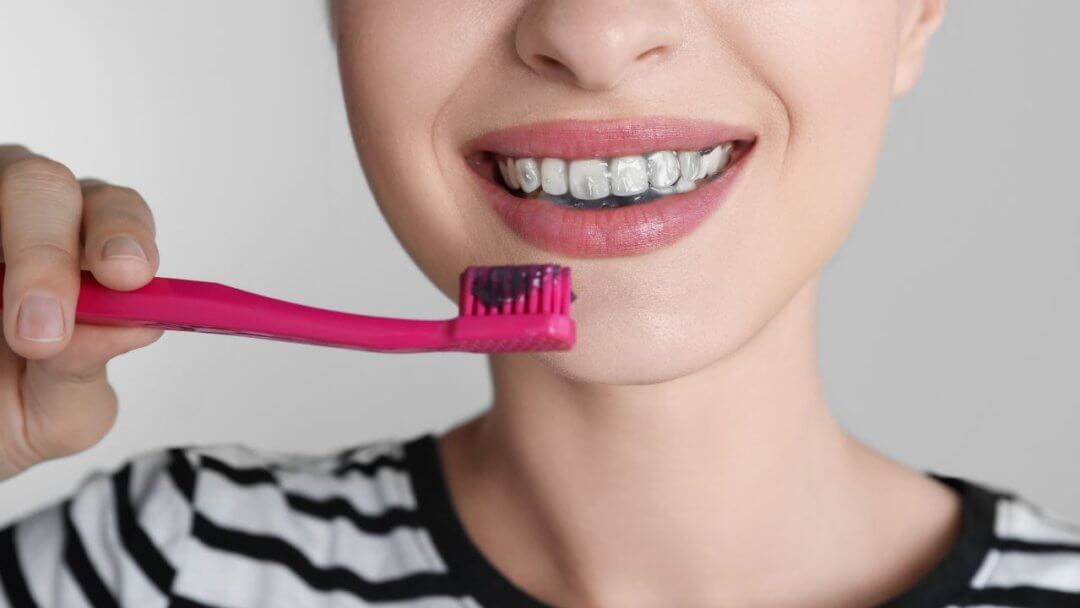Like a moth drawn to a flame, you’ve been lured by the siren call of charcoal-infused toothpaste promising pearly whites. Its pitch-black hue might seem counterintuitive for something that claims to whiten your teeth.
But can charcoal really do the trick? It’s important to sift through the black-and-white facts before jumping on this bandwagon. You’re probably wondering about its effectiveness and safety, or if it’s just another marketing gimmick in the vast ocean of dental products.
Well, you’re not alone in your curiosity. In this article, we’ll take a closer look at charcoal toothpaste – weighing its pros and cons, examining its potential risks and side effects, as well as exploring other alternatives for achieving that coveted bright smile. Get ready to delve deeper into this dark mystery!
The Rising Trend of Black Toothpaste
You’ve likely noticed there’s been a surge in popularity for black toothpaste, but it’s not just a fad—it’s part of the growing trend toward unconventional methods of dental care.
This product popularity is primarily tied to one key ingredient: charcoal. Infused into toothpaste, this natural substance promises whiter teeth and better oral hygiene.
Marketing strategies have played a significant role in shaping the public perception of charcoal-infused toothpaste. Clever advertising campaigns highlight the benefits of these products, focusing on their ability to remove stains and enhance smiles.
These messages are becoming more compelling due to an increasing number of consumer testimonials praising these products’ effectiveness.
Cultural influences also contribute significantly to this trend. For instance, Eastern cultures have long recognized charcoal’s purifying properties, which Western societies have now embraced.
This has resulted in global availability that surpasses traditional boundaries—making it easy for consumers worldwide to purchase and try out this unusual form of oral care.
Consumer testimonials further fuel the demand for black toothpaste. Stories circulating online about dramatic improvements in teeth whitening are driving people to test this product themselves, contributing to its rising popularity.
But what does science say about all this? Research has shown mixed results regarding the effectiveness and safety of using charcoal for teeth whitening—a topic we’ll delve deeper into later on.
Despite potential uncertainty about its efficacy or possible side effects, one thing remains clear: black toothpaste continues captivating consumers around the globe with its promise of brighter smiles without conventional means.
Claims Made About Charcoal-infused Toothpaste
It’s been touted far and wide that black-infused dental paste holds the secret to a brighter smile, but is there any truth behind this claim? To answer that question, it’s important to delve into the charcoal origin and its incorporation in toothpaste.
The use of charcoal for oral hygiene dates back centuries, with ancient civilizations leveraging its porous nature for cleaning purposes. Modern-day brands have adapted this concept, grinding down charcoal into a fine powder and mixing it into their products.
When performing an ingredient analysis, one can find activated charcoal as the star player in these specialty pastes. It’s believed that this component acts as a natural whitener by absorbing plaque and microscopic particles that cause stains. However, it’s worth noting that not all dentists agree on its effectiveness or safety.
Brand comparisons reveal a wide range of claims about these dental care products. Some tout their natural ingredients while others highlight their whitening abilities.
Marketing tactics employed by companies often involve showcasing dramatic before-and-after photos or sharing positive consumer experiences with potential buyers.
However, when you sift through consumer experiences beyond marketing material, reviews are mixed at best.
Many users report noticeable whitening effects after consistent use over weeks or months while others complain about lackluster results or even damage to their teeth enamel due to the abrasive nature of the charcoal.
As you explore your options for achieving a whiter smile, remember: don’t be swayed simply by catchy advertisements or influencer endorsements. Instead, do your own research and consider consulting with your dentist before introducing new elements into your oral care routine.
Evaluating the Effectiveness of This Method
Despite all the hype, there’s a lingering question: does this black-infused paste genuinely deliver on its promises or is it merely a marketing gimmick playing on our collective desire for pearly whites? To answer this, let’s delve into the science behind charcoal absorption and how it affects oral hygiene.
Charcoal has been known for its absorbing properties. Its porous nature allows it to bind with certain compounds, thus theoretically speaking, it should absorb surface stains from your teeth.
However, the reality is not that straightforward. There are different types of charcoal used in toothpastes – activated, hardwood, coconut shell – each having varying degrees of effectiveness.
Consider these facts:
- Charcoal has abrasive qualities which can lead to teeth sensitivity over time.
- It absorbs both good and bad bacteria in the mouth affecting overall oral hygiene negatively.
- There are no long-term studies supporting claims of whitening and safety related to charcoal use in toothpaste.
Now onto tooth enamel – the hard outer layer of your teeth providing protection against decay. Regular use of abrasive substances like charcoal can cause erosion of this protective layer leaving your teeth vulnerable. Moreover, unlike traditional fluoride toothpaste which helps remineralize your tooth enamel by replacing lost calcium and phosphate ions- there’s no evidence suggesting that charcoal provides any such benefits.
So before you jump on the bandwagon believing that black will make your smile brighter remember what’s at stake here-your overall dental health balance. Consider consulting with a dental professional before introducing any new product into your daily oral care routine to ensure safe practices are being maintained.
Potential Risks and Side Effects
While we’ve gently tiptoed around the subject, it’s time to dive headfirst into the not-so-pleasant side of this blackened paste trend.
Yes, charcoal can potentially whiten your teeth but it comes with a few potential risks and side effects that you should be aware of.
Firstly, enamel damage is a significant concern. The abrasive nature of charcoal can wear away the protective outer layer of your teeth, leaving them susceptible to cavities and decay. This damage is irreversible, as once lost, enamel cannot regenerate or be replaced.
Moreover, its loss can lead to an increase in sensitivity since without the protective layer of enamel, the nerves within your teeth become exposed to hot and cold temperatures.
Then there’s gum irritation to consider. Charcoal particles are known for being rough and could easily irritate or even injure your gums if brushed too vigorously. This might result in redness, swelling or bleeding gums which would cause discomfort while eating or drinking.
The long-term effects of using charcoal toothpaste are still unknown due to lack of extensive scientific research on this matter. However, one thing is clear – frequent use may lead to more harm than good.
Lastly, allergic reactions shouldn’t be overlooked either because some people may experience them after using charcoal-based products.
So before you decide whether to start brushing with charcoal toothpaste regularly for its whitening effect or not; weigh these potential risks against the benefits carefully.
Remember that maintaining oral health should always come first before aesthetic considerations such as having pearly white teeth.
Alternatives for Achieving a Brighter Smile
So, you’re after that Hollywood smile but aren’t so keen on the potential pitfalls of charcoal toothpaste? Let’s explore some safer and proven alternatives. While charcoal may seem like a trendy solution, it isn’t the only route to a brighter smile.
One alternative is natural bleaching. This involves using substances such as baking soda or hydrogen peroxide which are less abrasive than charcoal and can effectively remove stains over time.
Also, incorporating a teeth-friendly diet into your lifestyle could help maintain your pearly whites. Consuming foods rich in calcium and avoiding those high in sugar or dark-colored drinks can prevent staining and promote overall dental health.
- Dental veneers: These thin shells made of porcelain or composite material cover the front surface of your teeth to improve their appearance.
- Laser whitening: This in-office treatment uses heat from a laser to activate a whitening agent applied to your teeth.
- In-office treatments: Professional cleaning sessions can remove stubborn stains while fluoride treatments strengthen enamel.
Remember, good oral hygiene is key for maintaining bright teeth. Regular brushing with fluoride toothpaste, flossing daily, and routine check-ups with your dentist are crucial elements for preserving that radiant smile.
Just because you’ve decided against charcoal doesn’t mean there aren’t other effective options available. Whether you choose natural bleaching methods, dental veneers or laser whitening procedures; there’s an array of safe possibilities out there tailored to suit everyone’s needs.
The first step towards achieving that desired Hollywood smile might just be around the corner at your local dental clinic!
Conclusion
So, you’re curious about charcoal toothpaste’s claims of pearly white teeth. Picture this: just as one swallow doesn’t make a summer, one ingredient may not dramatically whiten your smile.
Studies are still inconclusive and risks can outweigh rewards. For a radiant grin, consider safer alternatives like professional whitening or ADA-approved products. Remember, it’s all about maintaining that winning smile in the healthiest way possible!




No Comments